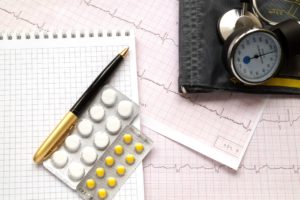 If you are one of the many Americans who take a common blood pressure drug, you could be at risk for diverticulosis. This new research from a team of scientists led by Imperial College London investigated the effectiveness and side effects of three common blood pressure medications: ACE-inhibitors, beta-blockers, and calcium channel blockers.
If you are one of the many Americans who take a common blood pressure drug, you could be at risk for diverticulosis. This new research from a team of scientists led by Imperial College London investigated the effectiveness and side effects of three common blood pressure medications: ACE-inhibitors, beta-blockers, and calcium channel blockers.
Worldwide, high blood pressure affects one in ten adults and can increase the risk of stroke and heart attack. Because the most common treatment for high blood pressure is medication, studies such as this one are imperative to help prevent potential side effects.
Lengthy and Expensive Clinical Trials
Advertisement
The problem with studying these medications being taken by millions is that they can be difficult and often involve lengthy and expensive clinical trials. To overcome this problem, the researchers used genetic analyses to study the effects of the drugs. By examining versions of genes that mimic the effects of blood pressure drugs, researchers were able to study the drugs’ effectiveness and any potential side effects.
The study published in the journal Circulation identified the proteins targeted by the drugs which help lower blood pressure. It also included analyzing genetic data from around 750,000 people and identifying so-called genetic variants that code for these proteins. The research team then studied whether these gene variants were linked to an increased or decreased risk of other diseases.
As expected, the so-called genetic variants were linked to lower stroke risk and heart disease. The interesting part of the study was how after assessing the risk of over 900 different diseases, the research showed that the versions of genes related to the effects of a particular type of calcium channel blocker were linked to increased risk diverticulosis.
Diverticulosis is a condition that affects mainly the elderly. It causes small pouches or bulges to appear in the lining of the intestine. In some cases, it can lead to a medical emergency if the pouches become infected or burst.
The connection between the blood pressure drugs and diverticulosis does need further investigation with larger trials, explains Dr. Dipender Gill, co-lead author of the research. “This is the first time that this class of blood pressure drug has been associated with diverticulosis. We’re not sure of the underlying mechanism – although it may relate to effects on the function of intestine muscles, which perform contractions to transport food through the gut.”
Dr. Joanna Tzoulaki, senior author from Imperial’s School of Public Health, added: “The study of genetic variants that mimic the effect of drugs is evolving as a powerful concept to help prioritize clinical trials and design clinical trials more likely to be successful.”
Advertisement
Dr. Gill does warn that these latest findings should not change prescription guidelines and that people should not stop taking any medication unless first consulting with a doctor.
He concluded, “These findings should not change clinical practice, but instead should act as a catalyst for further research.”
Also read:
- Diverticulitis vs. diverticulosis: Causes, symptoms, risk factors, and complications
- Diverticulitis and the impact of alcohol
- Diverticulitis diet: Foods to eat and foods to avoid
